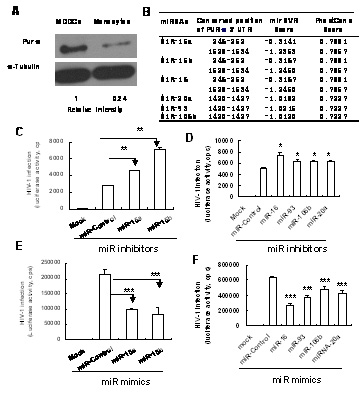At present, the AIDS vaccine has not yet achieved a fundamental breakthrough. The clinical treatment drugs for HIV type 1 (HIV-1) infection mainly inhibit viral replication by inhibiting the function of viral proteins, such as HIV-1 reverse transcriptase and proteinase Inhibitors, etc. However, these drugs against viral proteins are prone to drug resistance, and have large side effects and poor patient compliance, making it difficult to obtain the desired ideal therapeutic effect.
In fact, viral replication is highly dependent on the expression of host genes, but at the same time, viral replication is restricted by certain gene products in specific cells. If we look at it from another perspective, starting from studying the restriction mechanism of host cells and HIV-1 replication, we may be able to find new antiviral targets based on host molecules. For example, the FDA-approved clinically applicable drug Maraviroc inhibits viral infection by blocking the HIV-1 co-receptor CCR5 expressed by host cells.
Following this line of thinking, the researchers targeted monocytes: a host cell that limits HIV-1 infection. Monocytes are important immune cells of the body and can differentiate into dendritic cells or macrophages, mediating the body's immune response against pathogens. Although undifferentiated monocytes express the HIV-1 receptor protein CD4 and the co-receptor protein CCR5 / CXCR4, they cannot effectively support the replication infection of HIV-1. Only when monocytes differentiate into dendritic cells or macrophages can HIV-1 show a certain degree of replicative infection. HIV-1 showed limitations in monocytes in terms of reverse transcription, genome integration, and gene transcription.
Under the guidance of Researcher Wang Jianhua, Dr. Shen Chanjuan, Shanghai Institute of Pasteur, Chinese Academy of Sciences, etc., using gene transcription chip technology and integrated bioinformatics analysis, compared gene expression of monocytes and dendritic cells differentiated from them Differences; studied the role of differentially expressed genes in inhibiting HIV-1 infection; analyzed the expression regulation mechanism of these genes in monocytes. The researchers took the Pur-alpha gene as a representative and analyzed the importance of its full expression for HIV-1 replication; it was found that highly expressed microRNA in monocytes inhibited the translation of Pur-alpha, making HIV-1 unable to effectively transcribe , Thereby limiting HIV-1 replication.
This study based on the interaction between host genes and viruses helps to find more ideal, stable and long-term antiviral targets. In addition to the Pur-alpha gene, this research model can also continue to study the role and regulatory mechanisms of other host factors in HIV-1 replication more widely, providing broad new ideas for drug design and gene therapy.
The research results were published in the international academic journal FASEB Journal in July 2012. The research was supported by the Chinese Academy of Sciences, the National Fund Committee, the 973 Project, and the Shanghai Project.

MicroRNA regulates the replication of HIV-1 in monocytes / dendritic cells by regulating the expression of Pur-alpha. A) Low expression of Pur-alpha in monocytes; B) Pur-alpha protein translation is regulated by MicroRNA; CF) Using MicroRNA to regulate Pur-alpha translation can regulate HIV-1 in monocytes (C, D) and Replication in dendritic cells (E, F).
Slicer and dicer(meat dicer) are used in different fields of food industrial such as for meat, cheese, vegetables, fruits etc. Helper`s slicer and dicer seies are applied in both restaurant and industrial plant. To produce portioned bacon, the Rib chopper will help. To make vegatable and meat mixture for dumpling production, QD02 vegetable dicer will be the best choice.
In addition to them,we also supply the cubing machines.
Potato Slicer,Food Chopper,Vegetable Dicer,Vegetable Cutter,Meat Dicer,Cubing Machines
Helper Machinery Group Co., Ltd. , https://www.helperfoodequip.com